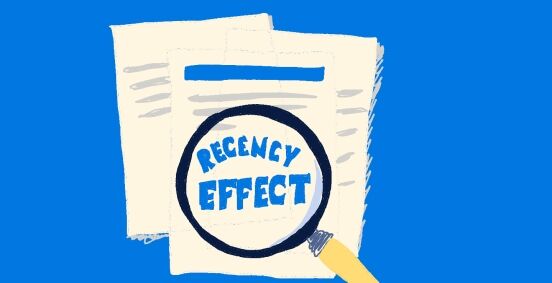Could your memory be playing tricks on you at work? Based on the recency effect, the answer is yes.
The APA Dictionary of Psychology defines the recency effect as “a memory phenomenon in which the most recently presented facts, impressions, or items are learned or remembered better than the material presented earlier” that can “occur in both formal learning situations and social contexts.”
In the workplace, this psychological phenomenon can impact your team in different ways – the most important one being that it affects performance reviews and promotions. It can also impact how you are perceived as a leader. Here is what you need to know about the recency effect at work to avoid its unconscious pitfalls.
The recency effect and performance reviews
Picture this: A team member makes a mistake that costs the company revenue. Six months prior, they had scored a big win. Now that you know about the recency effect, what do you think would happen if they were to have a performance review right after their mistake?
“The recency effect most definitely creates a bias in the performance review process, which has an impact around compensation and promotion/succession for employees,” says Victoria Pelletier, an HR expert, senior executive, public speaker and author passionate about DEI. She recommends adopting a multi-prong approach to performance and coaching. Instead of a yearly performance review process, teams should have access to regular one-on-one coaching sessions and formal feedback quarterly or semi-annually.
As a manager, it’s crucial to be aware of recency-related biases during feedback and coaching sessions. “You want to ensure that promotions and evaluations take a holistic and consistent look at your employees’ performance and also reward loyalty. It is important to take a look at the full year and how the employee has performed,” says executive career coach Prerika Agarwal.
“The flip side of this is that employees may only have had success recently and so as leaders, we only remember these pieces. This gives this employee an unfair advantage over those who have been consistently performing but recently had a miss.”
As an employee, you want to mitigate this by documenting your successes and contributions year-round and taking charge of performance-related conversations. “I tell all my clients to keep an active list of all their successes and share this with their manager throughout their check-ins and touchpoints for the year,” says Agarwal. “It is also important to share your wins when you are putting your name in the hat for your next project at work. Do not assume that your leadership team knows or remembers everything that you have done. Make their job as easy as possible by sending them this list.”
The recency effect when you communicate as a leader
While performance reviews are one of the most glaring examples of the recency effect in action at work, it can seep its way into any interaction between coworkers. This particularly matters if you’re in a leadership position and care about the way you communicate.
“For example, the recency effect can exist when we see an executive or business leader present well or poorly at a town hall – people who don’t regularly engage with these leaders make assessments based upon this last communication or performance, rather than day-to-day ongoing leadership skills and capability,” according to Pelletier.
Knowing about the recency effect may put more pressure on that next all-hands presentation, but if you nail it, consider that it can have a big positive impact on your reputation as a leader.
How to combat the negative effects of the recency effect
At the end of the day, whether you’re an individual contributor or an executive, becoming conscious of blind spots and biases will serve you while fostering a healthier and more inclusive culture in your team. “We need to educate our leaders and teams about [the recency effect] and provide coaching and alternatives to combat it from occurring,” adds Pelletier.
She recommends doing the three following things:
- Insist on regular one-on-one feedback sessions.
- Encourage team members to maintain regularly documented notes and records of their successes and achievements against outlined performance requirements/metrics (this also means getting clear on what those benchmarks are and defining expectations).
- Educate team members about the recency effect and the bias it might have, especially right before performance review season.
